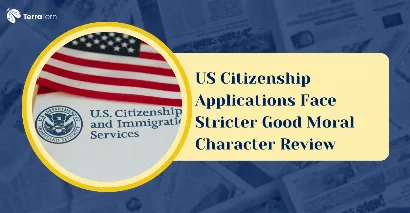Key Highlights
Being an American citizen got one step harder. On August 15, 2025, the US Citizenship and Immigration Services (USCIS) unveiled a significant policy change, which will significantly affect the assessment of citizenship applications. The new directive also mandates a more expansive evaluation of the "good moral character" of the applicants, with criminal background checks being only some of these evaluations, regarding contribution to the community and personal behaviour being assessed.
Also Read: Nursing Jobs in USA: Experts' Latest Jobs & Salaries
What Changed in the Good Moral Character Assessment
The good moral character analysis has worked as a rudimentary checklist for decades. Serious criminal acts like murder, aggravated felony, drug offences or multiple drunken driving cases were the main factors that the immigration officers sought. This was an easy requirement to pass on the part of the applicants, provided that their records were clean.
The new policy has changed this mechanical review; USCIS officers will be required to do more than a cursory mechanical assessment based on indicating the absence of wrongdoing as expressed in the official memorandum. Instead, they will perform a holistic evaluation of the behaviour of an alien, whether they adhere to societal rules, and the constructive contributions that demonstrate good moral character.
Key Factors USCIS Will Now Evaluate
The enlarged evaluation has various positive attributes of character:
-
Contributions and involvement of the community in the United States
-
Family caregiving duties and relationships in the nation
-
Learned accomplishments and gains
-
Solid and legal working experience
-
Tax and financial integrity
-
Duration of legitimacy of residence in the United States
Minor Infractions Could Impact Applications
The policy also deals with the actions that do not reach the level of crimes but may show character issues. Citizenship determinations might now be affected by reckless or persistent traffic offences, harassment or aggressive solicitation. Such moves differentiate between technically legal immigrants and good moral character provers.
Also Read: Top Software Engineer Jobs in USA: New Pay, Scope & More
Impact on Different Immigrant Communities
There will be a certain impact on particular groups of immigrants. In the fiscal year 2024, 818,000 foreigners became US citizens. The largest group was Mexican, numbering 107,000 new citizens (13 per cent of the total), followed by Indians with more than 49000naturalisationss (6 per cent of the total).
Students and professionals will encounter smart challenges with the system. International students with minor violations or even tax rifts that have not yet been resolved may have their applications under grave suspicion. But the policy also gives hope to those who show rehabilitation through community services, paying taxes or through stable jobs.
|
Applicant Category |
Previous Assessment |
New Assessment Factors |
|
Clean Record Applicants |
Automatic approval |
Must show positive contributions |
|
Minor Violation History |
Case-by-case review |
Rehabilitation evidence required |
|
Students/Professionals |
Standard background check |
Academic achievements, community ties |
Also Read: How Many Types of Visas are in the USA? New Full Expert Guide
Rehabilitation Can Overcome Past Issues
Policy acknowledges that the mistakes of the past cannot necessarily disqualify anybody. Evidence of Rehabilitation: USCIS officers will take into consideration evidence of rehabilitation that includes:
-
Probation terms adherence
-
Paid off late child support or tax Payments
-
Community support letter
-
Evidence-based behaviour modification
This tactic is a hope that those applicants who have engaged in slight legal and financial woes but have turned their lives around and made a difference in their respective communities.
Processing Times and Application Strategy for US Citizenship
The 2025 processing times have been significantly improved at the naturalisation level, with Form N-400 (citizenship application) wait times being the fastest. Yet the current adjusted examination needs can decrease the rate at which single cases are reviewed because police officers make more extensive analyses.
|
Processing Aspect |
2024 Timeline |
2025 Expectations |
|
Initial Review |
6-12 months |
8-14 months |
|
Background Checks |
Standard screening |
Enhanced social media review |
|
Character Assessment |
Criminal history only |
Holistic evaluation |
Applicants should prepare comprehensive documentation demonstrating their positive contributions to American society. This includes:
-
Community service records
-
Employment history and achievements
-
Tax payment documentation
-
Educational certificates
-
Character reference letters
Also Read: Difference Between B1 and B2 Visa USA: Experts' New Guide
What This Means for Future Applications?
The directive issued by the Trump regime reflects a radical change in the philosophy of citizenship assessment. Candidates need not just stand by their ways of disqualification, but also show affirmatively their desire to become an American citizen through good behaviour and community-related activities.
Long before citizenship is acquired, a green card holder needs to start documenting their actions in the community and making positive contributions. The novel standards demand evidence of assimilation into American society over and above legal assimilation.
Conclusion
Under the updated policy of the USCIS, the review of the good moral character of U.S. citizenship has become more rigorous. Applicants are expected to demonstrate a good moral character by making a positive contribution and not engaging in criminal activity. This makes the acquisition of citizenship even harder for citizenship seekers. Still, on the other hand, it also has advantages for those who have been able to go beyond the ordinary and have been able to give back to American society. The aspiring citizens would be expected to serialise a complete record of their good character values and contribution to the community in satisfying these higher evaluation thresholds. Contact TerraTern for more information!








